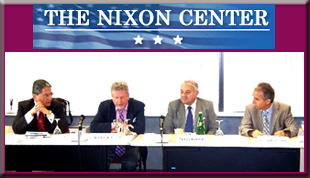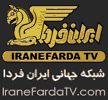March 12, 2009
Stoned in Tehran

The Iranian nuclear program continues despite widespread international objection, and its sponsorship of terrorist organizations, such as Hezbollah, poses a constant threat. Furthermore, Iran’s regional and global influence is potent and growing, in part due to its vast energy resources, making Iran’s ambitions even more pressing. In order to provide answers to these questions, as well as offer a unique perspective on the domestic sociopolitical landscape of Iran, the Nixon Center hosted a panel discussion entitled “Iran: Questions for the Next Administration” .
Parviz Dastmalchi, an Iranian author and founder and editor of the well known
periodical magazine Ketabe Jomeha, Alireza Nourizadeh, a senior commentator for Voice of America’s Persian news network and longtime journalist, and Mehrdad Khonsari, the Senior Research Consultant at the Centre for Arab and Iranian Studies in London and a former Iranian diplomat, spoke on the common goal of a more democratic Iran, which they advocate through their organization, Democratic Alternative. Also contributing to the discussion were Mohsen Sazegara, an Iranian journalist and former member of the Iranian government, and Reza Pahlavi, the Crown Prince of Iran. The discussion was moderated by Geoffrey Kemp, the Director of Regional Strategic Programs at The Nixon Center.
After a brief introduction from Dr. Kemp highlighting the fluid nature of American-Iranian relations, Alireza Nourizadeh explained the need for continued dialogue on Iran. It is important, he stated, to bring attention to the views of a vast majority of Iranians that are often unnoticed. Nourizadeh emphasized the need for extensive reform, estimating that only 15–20 percent of the Iranian people support the current regime. But is it reasonable, given the theocratic and authoritarian nature of the Islamic Republic, to expect any substantial reform?
Parviz Dastmalchi was skeptical of the prospects. First, Iran’s system of government and constitution, based on Ayatollah Khomeini’s concept of “rule of jurisprudence,” constitutionally entrenches the power of the religious elite. Furthermore, Iranian laws create inequalities that deny political rights to the majority of its citizens. As a result, most Iranian citizens are unable to legally participate in any reform movement. Dastmalchi went on to argue that because of this neglect of its own people’s rights, Iran sees no reason to commit to the principles of democracy on the international level. He identified the governance of the Iranian regime as “a new form of totalitarianism,” regimes that history has shown can only be reformed by their complete collapse.
Both Mehrdad Khonsari and Reza Pahlavi supported Dastmalchi’s opinion that the main obstacle to reform in Iran was the religion-based constitution, but offered a bit more optimistic view on the prospects for change. Pahlavi called for a shift in the focus of Iranian reformist movements. Instead of simply focusing on the election of a reform-minded president, the goal should be a constitutional referendum that could facilitate genuine change. He cited, as did all of the panelists, the example of former president Mohammed Khatami, who was elected behind a wave of popular support for reform, but whose term saw the highest number of detainments, arrests and executions since 1979.
From the perspective of the international community, however, the need for domestic reform is secondary to Iran’s nuclear program and expansion of its global influence. Alireza Nourizadeh warned that the growth of Iran’s influence, not only in the Middle East but also in Latin America, should not be ignored. In the past, failure to curb Iran’s foreign-policy objectives led to the creation of Hezbollah, one of the world’s largest and most well-organized terrorist groups. Nourizadeh cited the expansion of Iran’s Quds force and the regime’s strengthening ties with the governments of Venezuela, Bolivia and Nicaragua as the very alarming. Likewise, the fiery rhetoric of Iranian President Mahmoud Ahmadinejad, Nourizadeh noted, should not be taken lightly. Ahmadinejad’s belief in the inevitability of confrontation between Iran and the United States is only further evidenced by the intensification of Iranian involvement in Latin America, what Nourizadeh called “America’s backyard.” Iran’s need to expand its sphere of influence, as Khonsari argued, is also the result of the ideological divide between the regime and its people. The lack of domestic support for the government has forced Iran to look outside its borders to find sources of political legitimacy.
In seeking to curtail Iran’s influence and diffuse the growing nuclear crisis, the lead role will certainly fall to the United States—presenting a daunting challenge for the next administration. Khonsari identified the current “buzz word” surrounding these issues as “engagement.” While direct talk with Iran will certainly be necessary if any mutually acceptable solution can be reached, Khonsari noted that such engagement will not necessarily lead to successful negotiations and will have to be approached in a careful and calculated fashion. Similarly, a resolution of the complicated issue of Iran’s nuclear program that avoids military confrontation will demand a creative approach. Coupled with the advancement of engagement, all the panelists supported the idea of “smart sanctions.” These sanctions, which could include restricting the travel of Iranian diplomats, curtailing gas sales to and oil purchases from Iran, and an effort to directly engage the Iranian people themselves, would serve to both isolate Iran’s government and garner support from the population as a whole.
It is this type of support for the Iranian people that Reza Pahlari, Mehrdad Khonsari and Mohsen Sazegara envision as the greatest hope for reform within Iran and the cornerstone of U.S. policy in the future. Due to the divide between the regime and its people, it is not sufficient to engage Iran on a purely political level. The United States must show support for the principles of democracy supported by the Iranian people—human rights, equality, free elections, and freedom of the press—by not focusing purely on the issue of Iran’s nuclear program and refusing to pander to the opportunistic media escapades of President Ahmadinejad. Khonsari stressed that the new U.S. administration will need to develop a robust and clearly defined policy concerning Iran, which focuses on pragmatic change instead of hollow rhetoric. Whatever this new policy may be, it is the people of Iran who will be the true agents of change.
by Thomas M. Moore
Thomas M. Moore is an intern at The Nixon Center.
September 24
March 12, 2009 01:06 AM
